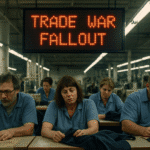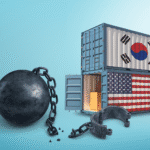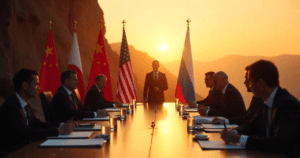On April 7-9, 2025 the U.S. Chamber of Commerce lead a delegation headed by Mr. Steve Lutes, Vice President, Middle East Affairs, representing 101 U.S. companies to meet with the Iraqi Government and the US Mission in Baghdad. The focus of the delegation was on the oil, natural gas and the healthcare fields, and strengthening the partnership of private sector of the American and Iraqi businesses. It’s worth noting, that during the Biden Administration, such attempts were made through the U.S.-Iraq Business Council (USIBC) in 2021, and provided four main recommendations related to: Establishing a relationship between the health and the private sector; improving gas infrastructure; reforms in the financial sector; developing of special economic zones to encourage investments and job creation.
However, since the Defeat-ISIS Campaign and freeing Iraqi territories once controlled by the ISIS terrorist groups, Iraq has witnessed increased influence of the Iranian Revolutionary Guard Corps (IRGC) through the Iranian-backed militias including the Popular Mobilization Force (PMF) aka “Al Hashid”. These are the groups that have pledged allegiance to the so-called Ayatullah Ali Khamenei, the Iranian Supreme Leader, and announced publicly that they only take orders from the IRGC and Khamenei. Such structure has made Iraq as a subservient to Tehran with full scale infiltration and control of Iraq critical infrastructure and institutions. This claim comes from various open-source intelligence, reports and public announcements. These armed groups became the Iranian proxies and the backbone of the resistance axes they target the US interest in Iraq and in the Middle East region. Further, these Iranian-backed proxies have strong ties with political Islamic factions who formed the ‘Coordination Framework’ a political party headed by Noori Al-Maliki, the former Prime Minister, from which the current government of Al-Sudani was put in place.
Recent reports indicated Iraq’s involvement through Iranian proxies and loyalists in acts related to terrorism, such as, financing, training, and equipping terrorist groups. There are also, official measures taken by the U.S. Department of Treasury, which has sanctioned prominent personalities and financial institutions in Iraq under counterterrorism laws. The paradox for the U.S. companies and their significant efforts to enter the Iraq’s market, can be described as walking on eggshells or even worse entering a minefield with no compass. Therefore, it is indeed vital to prioritize Iraq’s security concerns as a prerequisite matter for the U.S. companies large and small to have success.
On the one hand, Iraq has been going through political and security turmoil since 2003, that left the country under the control and infiltration of the IRGC, the Islamic Resistance, Al-Qaida, and ISIS. In addition to the aftermath of October 7th, massacre and the fall of the Assad’s regime in December 2024, and the collapses of Hezbollah in Lebanon. Iraq has opened its doors to the leadership, the troops and their families to regroup and restructure themselves with the rest of the Iranian-backed proxies. It has also been reported that there are thousands of Shia’s Pakistanis and Afghans who entered Iraq and “disappeared”. Of course, people don’t just vanish; the more rational explanation is that they joined the armed groups to prepare them for forthcoming terrorist acts to continue the destabilization in Iraq and in the region. Conversely, Iraq is a “gem in the rough” not only rich with its natural resources, such as oil and gas, but rather, its fertile land, rivers, and youthful population as a great human capital. Not to mention, the untapped archaeology sites. Iraq has been gravely exploited, but not explored and not well utilized to benefit the Iraqi people as well as the world and humanity at large.
Consequently, the proposed a bipartisan “Free Iraq from Iran Act” introduced to Congress by Congressman Joe Wilson (R-SC) and co-sponsored by Representative James Panetta (D-CA), seem to be ideal, if enacted, to resolve the persistent Iraq’s security and political challenges. These challenges have hindered any significant progress to be made by the U.S. Chamber of Commerce and the USIBC to move forward with their envisioned strategy in the areas that could have advanced the U.S.-Iraq partnership. However, under the Trump Administration and the policy of “Peace through Strength” along with the economic focus of the Administration, aligned with the shared interests in the Middle East for a stabilized and prosperous region; altogether could lead to unprecedented success in Iraq. The Free Iraq from Iran Act could pave the road for the US companies large and small, to build a bridge between the US and Iraq, not only from a business and economic perspectives but rather, tying a knot between two peoples for generations to come. Iraq will greatly benefit, from lasting peace and business endeavors starting from the very basics of life with dignity, economic thrive, job creation, infrastructures, safety and security, law and order, tourism, education and public health. The U.S. companies and the American People will also significantly profit from such partnership, where Iraq is a new endeavor for industries to explore and discover resources, that otherwise, remain underground. To conclude, the Gate of Babylon can be opened to welcome the US companies and the American people to enter Iraq as a genuine partner and a potential ally once Iraq is largely freed from the Iranian regime influence and infiltration in the country. Iraq then, could be a true successful democracy and the ties between Great Nations will not be broken again!















